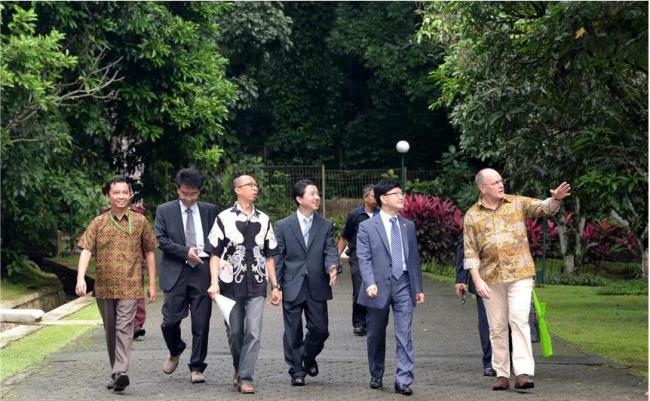Relaxing in a rich forest is a popular getaway these days for people living in a busy city, so they can escape from their hectic lives.
While seeing this growing trend in its own land, the state agency Korea Forest Service pledged to help its Southeast Asian neighbors recover their rich greenery and create educational and recreational forests in the region where deforestation is occurring rapidly due to industrialization.
As the first move in such efforts, Korea and Indonesia had a ministerial meeting in Jakarta last Thursday aimed at promoting cooperation in the sustainable development of forests in the archipelago.
The meeting was held on the sidelines of the opening event of the ecological park called Sentul Eco-edu Model Forest in Hambalang, Bogor near the city of Jakarta.
Around 300 government officials and those working for forest preservation and development from both nations took part in the event.
At the meeting, Korean Forest Service Minister Shin Won-sop and Zulkifli Hasan, the Indonesian forest minister, discussed ways to cooperate in preserving forests while developing environmentally friendly forest recreation facilities.
The ecological park, which covers 7 hectares, was formed in part of a 630-hectare state-provided site for forest management in Indonesia.
While seeing this growing trend in its own land, the state agency Korea Forest Service pledged to help its Southeast Asian neighbors recover their rich greenery and create educational and recreational forests in the region where deforestation is occurring rapidly due to industrialization.
As the first move in such efforts, Korea and Indonesia had a ministerial meeting in Jakarta last Thursday aimed at promoting cooperation in the sustainable development of forests in the archipelago.
The meeting was held on the sidelines of the opening event of the ecological park called Sentul Eco-edu Model Forest in Hambalang, Bogor near the city of Jakarta.
Around 300 government officials and those working for forest preservation and development from both nations took part in the event.
At the meeting, Korean Forest Service Minister Shin Won-sop and Zulkifli Hasan, the Indonesian forest minister, discussed ways to cooperate in preserving forests while developing environmentally friendly forest recreation facilities.
The ecological park, which covers 7 hectares, was formed in part of a 630-hectare state-provided site for forest management in Indonesia.

Some of the facilities out of the 10 buildings in the park are lecture rooms which can accommodate 100 people, accommodations, offices and a research laboratory.
The park will serve as a venue for both Korean and Indonesian students to learn of the importance and value of forest.
It is expected that forest recreation cultures of Korea can be introduced to the Indonesian youth.
“I hope this eco-park established through cooperation between Korea and Indonesia can provide a recreational as well as an educational place for the young people as they learn and dream in nature,” Shin said.
The Korea Forest Service promised that it would work together with the Indonesian forest ministry in developing the Hambalang region over the next seven years into a “green cooperation” landmark that has recreational forests and tropical gardens.
The planned project will be an opportunity for the Korean government to transfer the know-how of conserving nature and providing “forest welfare services,” according to the Korean ministry.
Paying a visit to sites of forestation projects led by Korean companies last Wednesday, prior to the Thursday meeting, Shin also discussed with his Indonesian counterpart how to vitalize investment in such projects as those involving 700,000 hectares of land and a 200-hectare biomass forest in the region.
“Korea should shed light on the value of forest resources. Korean companies should make forest investment in other nations in order to counter the climate change and reduce greenhouse gas emissions.
“The Korea government will be able to lay the foundation for a creative economy as the investment can create jobs,” Shin said.
The KFS minister also visited the Center for International Forestry Research in Bogor, last Friday ― marking the country’s first visit to the organization at the ministerial level.
At the meeting with CIFOR director-general Peter Holmgren and other high-ranking officials, Shin discussed and exchanged ideas on various issues concerning forest recreation, bioenergy and climate change.
Celebrating the 20th anniversary of the center this year, Holmgren explained to the Korean delegate about the center’s major research areas, their goals, as well as some of its research achievements.
“In order to increase the income levels for individuals making a living in the forest industry, forest recreation needs to be explored to enrich their livelihoods,” Holmgren said.
“We are hoping to beef up ties with Korea in the research area.”
While introducing the Korean government’s collaboration with other countries, including Germany and Japan, in leading research on forest therapy and recreation, Shin promised Korea will support research initiatives between the two nations.
The CIFOR was established in 1993 to facilitate a range of international and interorganizational cooperation and research activities focused on forest conservation and enrichment.
Since its inception, the center has made its name as a leading research institute with over 200 scientists and support staff, and some 200 partners in about 30 countries across the globe.
By Kim Young-won and Kwon Bum-joon
(wone0102@heraldcorp.com) (bjkwon@heraldcorp.com)
-
Articles by Korea Herald








![[Graphic news] S. Korea's children get taller](http://res.heraldm.com/phpwas/restmb_idxmake.php?idx=644&simg=/content/image/2024/06/02/20240602050186_0.gif&u=)











![[Today’s K-pop] Kep1er vows to keep going with 1st LP](http://res.heraldm.com/phpwas/restmb_idxmake.php?idx=642&simg=/content/image/2024/06/03/20240603050651_0.jpg&u=)